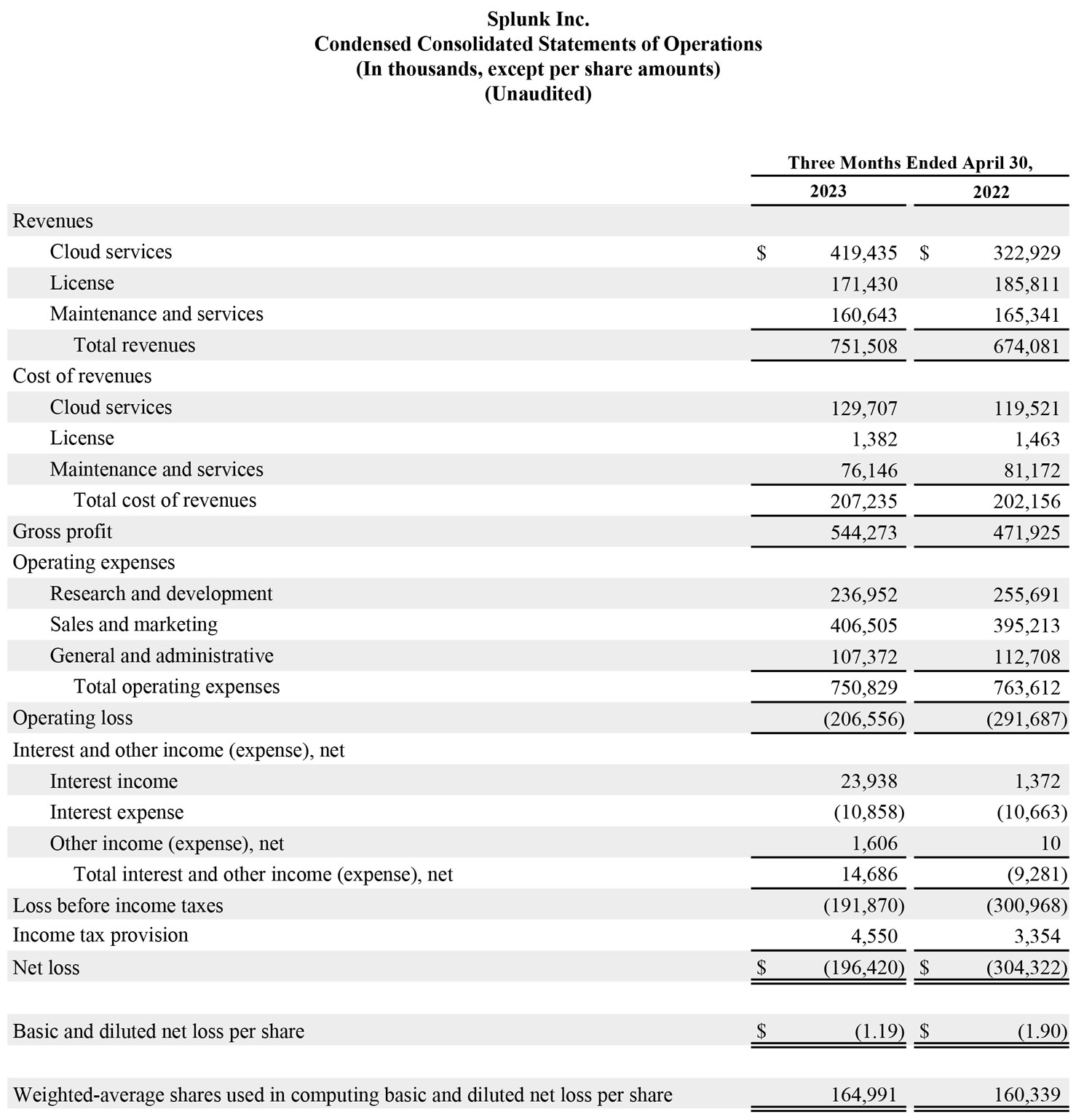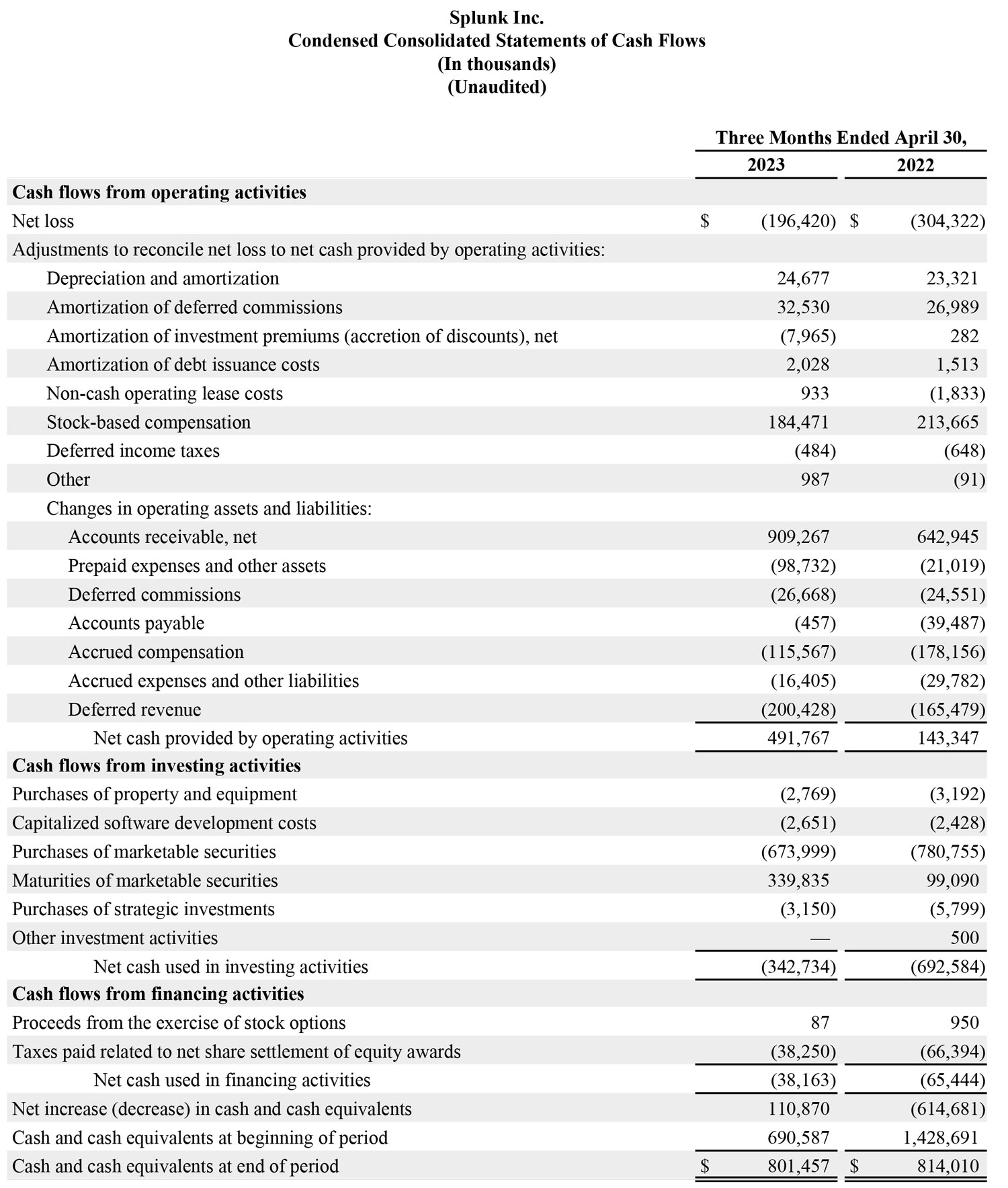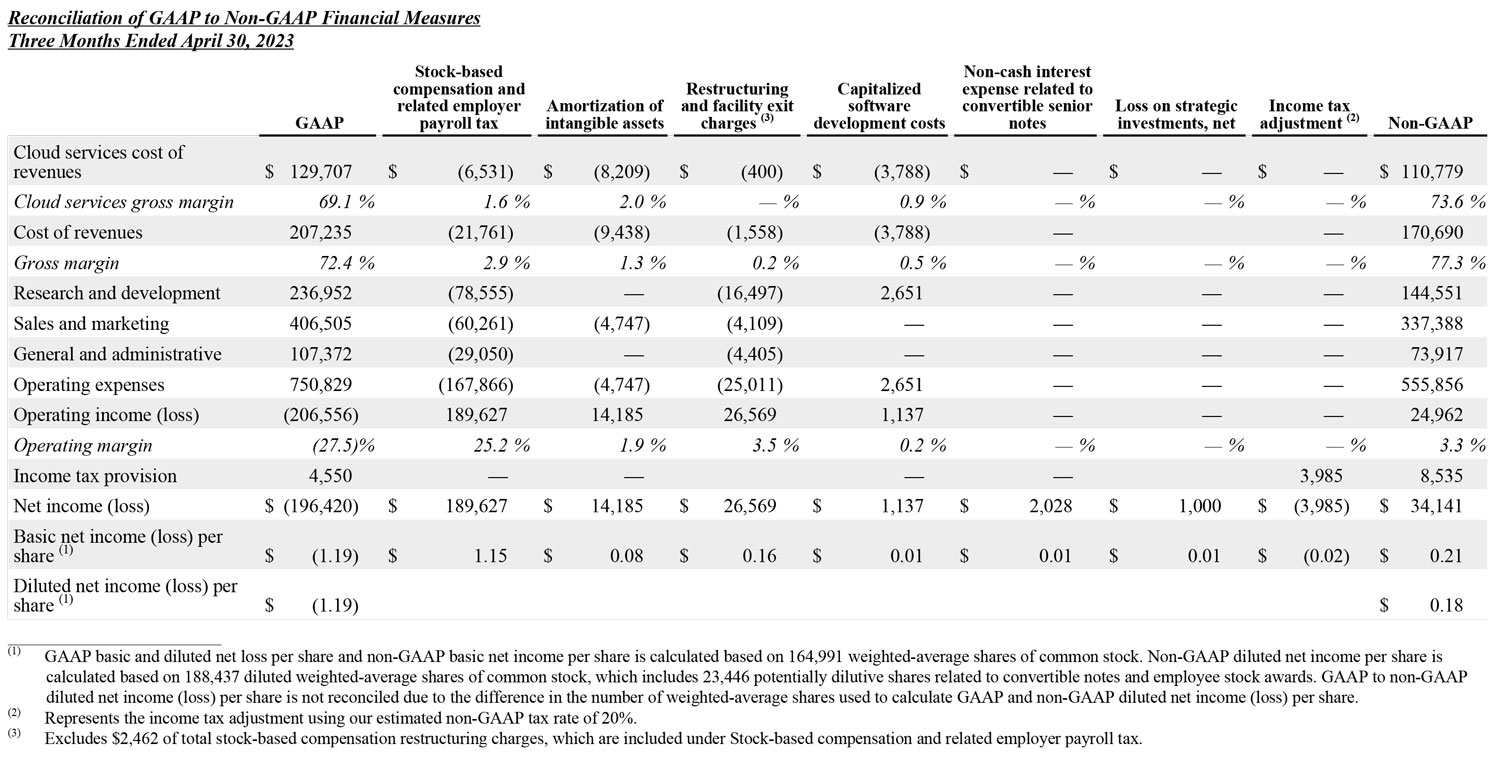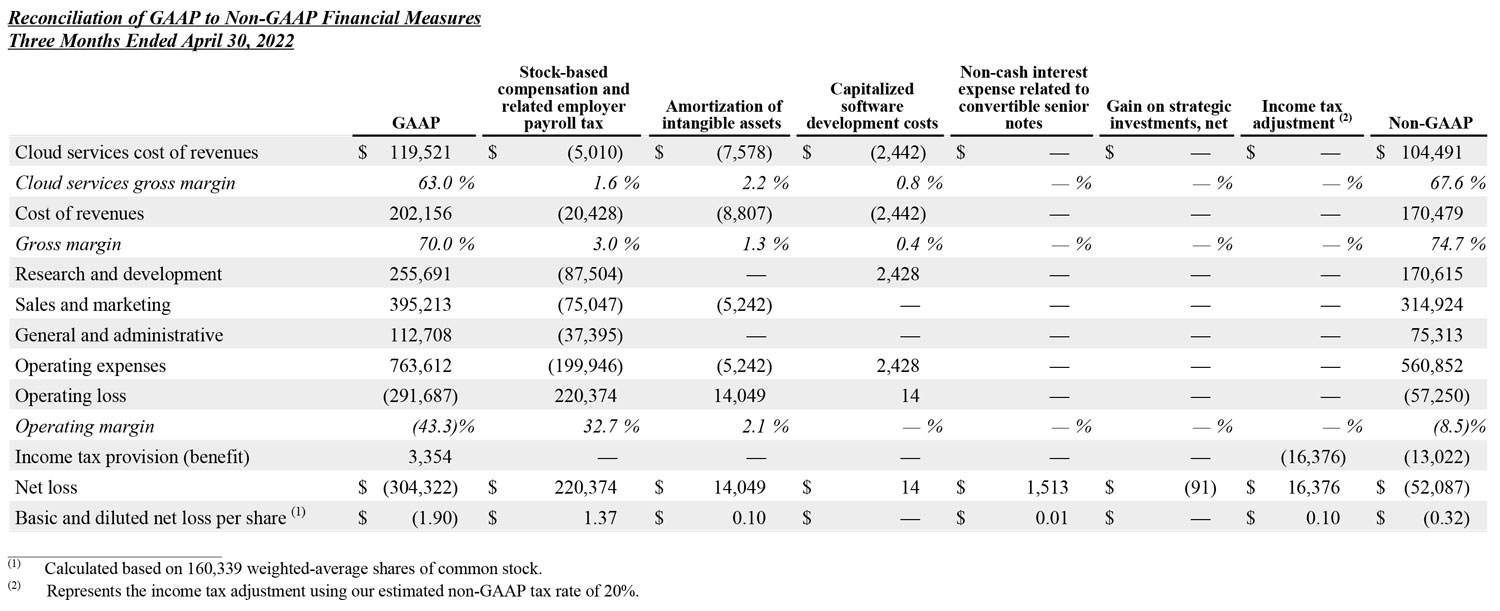May 24, 2023 – Splunk Inc. (NASDAQ: SPLK), the cybersecurity and observability leader, today announced results for its fiscal first quarter ended April 30, 2023.
First Quarter 2024 Financial Highlights
- Total ARR was $3.725 billion, up 16% year-over-year.
- Total revenues were $752 million, with Cloud revenue growing 30% to $419 million.
- GAAP Operating Expenses declined 2% year-over-year; non-GAAP Operating Expenses declined 1% year-over-year.
- Operating cash flow was $492 million, up 243% year-over-year.
- Free cash flow was $486 million, up 253% year-over-year.
- 810 customers with total ARR greater than $1 million, an increase of 120 year-over-year.
“Splunk delivered another solid quarter and once again delivered durable growth with increasing profitability and free cash flow,” said Gary Steele, President and CEO of Splunk. “Customers worldwide gain tremendous value from Splunk as we help make their digital systems more resilient amidst a formidable threat landscape, greater technology complexity and ever-increasing demand for better, faster digital experiences. Only Splunk has the enterprise scale, unified product portfolio, industry maturity and vision to meet their needs.”
“Q1 was a milestone quarter for Splunk, demonstrating our operating leverage as we generated 16% ARR growth while reducing non-GAAP operating expenses by 1% year-over-year,” said Brian Roberts, CFO of Splunk. “We met or exceeded all of our guided metrics. Notably, we generated nearly half a billion dollars of free cash flow in Q1 and are raising our operating margin and free cash flow outlook for the full year. We remain focused on delivering value to our customers while managing our expenses and increasing profitability.”
Recent Business Highlights
- Splunk® Delivers Unified Security and Observability Innovation: Splunk announced new enhancements to Splunk Mission Control and Splunk Observability Cloud, and the general availability of Splunk Edge Processor to help build safer and more resilient digital enterprises.
- Splunk Security for SAP® Solutions Now an SAP Endorsed App: Splunk announced its Splunk Security for SAP solutions is an SAP endorsed app, and listed on the SAP Store, to help deliver immediate value for security and SAP teams. The app, which is expected to be available for purchase next month, extends Splunk’s powerful security capabilities to SAP environments.
- Splunk Achieves 'In Process' Status for FedRAMP® High Authorization and ‘Pending’ Status for StateRAMP™ Moderate Authorization: Splunk achieved an “In Process” designation from the Federal Risk and Authorization Management Program (FedRAMP®) Program Management Office (PMO) and a “Pending” designation from the State Risk and Authorization Management Program (StateRAMP) as it works towards authorization to provide these attested versions of the Splunk Cloud Platform to government entities.
- Splunk Products Win Nine 'Best of' Awards: Resulting from customer reviews on TrustRadius, Splunk SOAR, Splunk Enterprise Security, and Splunk Log Observer were each recognized for Best Feature Set, Best Value for the Price and Best Relationship.
- State of Security 2023: Splunk released a new research report, The State of Security 2023, featuring insights from over 1,500 security and IT leaders.
- Splunk Names New Chief Customer Officer: Splunk appointed Toni Pavlovich as its Chief Customer Officer.
- Splunk Announces New Chief Technology Officer: Splunk appointed Min Wang as its Chief Technology Officer.
- Splunk Board of Directors Appointment: Yamini Rangan, President, CEO and Director of HubSpot, was appointed to the Splunk Board of Directors.
Financial Outlook
The company is providing the following guidance for its fiscal second quarter 2024 (ending July 31, 2023):
- Total ARR is expected to be approximately $3.825 billion.
- Total revenues are expected to be between $880 million and $895 million.
- Non-GAAP operating margin is expected to be between 10% and 12%.
- Free cash flow is expected to be approximately negative $15 million which implies trailing twelve months free cash flow of $785 million.
The company is providing or updating the following guidance for its fiscal year 2024 (ending January 31, 2024):
- Total ARR is expected to be between $4.125 billion and $4.175 billion.
- Total revenues are expected to be at the top-end of our prior range of approximately $3.9 billion (was previously between $3.85 billion and $3.9 billion).
- Non-GAAP operating margin is expected to be between 18% and 18.5% (was previously between 16.5% and 17.5%).
- Free cash flow is expected to be between $805 million and $825 million (was previously between $775 million and $795 million).
A reconciliation of non-GAAP guidance measures to corresponding GAAP guidance measures is not available on a forward-looking basis without unreasonable effort due to the uncertainty regarding, and the potential variability of, expenses that may be incurred in the future. For example, stock-based compensation-related charges, including related employer payroll tax-related items, are impacted by the timing of employee stock transactions, the future fair market value of our common stock, and our future hiring and retention needs, all of which are difficult to predict and subject to constant change. We have provided a reconciliation of GAAP to non-GAAP financial measures in the financial statement tables for our historical non-GAAP financial results included in this release.
Conference Call and Webcast
Splunk’s executive management team will host a conference call beginning at 1:30 p.m. PT (4:30 p.m. ET) today to discuss financial results and business highlights. Interested parties may access the call by dialing (800) 715-9871 in the U.S. or (646) 307-1963 from international locations and referencing conference ID 3063836. A live audio webcast and replay of the conference call will also be available on Splunk’s Investor Relations website at https://investors.splunk.com/events-presentations. An audio webcast replay of the call will be available for the next 12 months.
Safe Harbor Statement
This press release contains forward-looking statements that involve risks and uncertainties, including statements regarding Splunk’s long-term prospects, including Splunk’s guidance for total ARR, total revenues, non-GAAP operating margin and free cash flow targets for the company’s fiscal second quarter 2024 and fiscal year 2024; our global presence and trends in customer demand and engagement; statements regarding our operating efficiency, growth, profitability and cash flows; statements regarding our products, projects, technology and ongoing product development; statements regarding our market opportunity as well as our ability to meet customer needs; and trends in the markets for our products, including the security market. There are a significant number of factors that could cause actual results to differ materially from statements made in this press release, including: the macroeconomic environment, including inflationary pressures, economic uncertainty and impacts on information technology spending; risks associated with Splunk’s growth, particularly outside of the United States; the impact of Splunk’s restructuring plans; Splunk’s inability to realize value from its significant investments in the company’s business, including product and service innovations and through acquisitions; Splunk’s shift from sales of licenses to sales of cloud services which impacts the timing of revenue and margins; Splunk’s transition to a multi-product software and services business; Splunk’s inability to successfully integrate acquired businesses and technologies; Splunk’s inability to service its debt obligations or other adverse effects related to the company’s convertible notes; and general market, political, economic, business and competitive market conditions.
Additional information on potential factors that could affect Splunk’s financial results is included in the company’s Annual Report on Form 10-K for the fiscal year ended January 31, 2023, which is on file with the U.S. Securities and Exchange Commission (“SEC”) and Splunk’s other filings with the SEC. Splunk does not assume any obligation to update the forward-looking statements provided to reflect events that occur or circumstances that exist after the date on which they were made.
Splunk Inc. (NASDAQ: SPLK) helps build a safer and more resilient digital world. Organizations trust Splunk to prevent security, infrastructure and application issues from becoming major incidents, absorb shocks from digital disruptions, and accelerate digital transformation.
Splunk, Splunk>, and Turn Data Into Doing are trademarks and registered trademarks of Splunk Inc. in the United States and other countries. All other brand names, product names, or trademarks belong to their respective owners. © 2023 Splunk Inc. All rights reserved.



Splunk Inc.
Operating Metrics
Total Annual Recurring Revenue (“Total ARR”) represents the annualized revenue run-rate of active cloud services, term license and maintenance contracts at the end of a reporting period. Cloud Annual Recurring Revenue (“Cloud ARR”) represents the annualized revenue run-rate of active cloud services contracts at the end of a reporting period. We calculate cloud dollar-based net retention rate (“Cloud DBNRR”) by dividing the Cloud ARR at the end of a period (“Cloud Current Period ARR”) by the Cloud ARR of the same group of customers at the beginning of that 12-month period. Cloud Current Period ARR includes existing customer renewals and expansion and is net of existing customer contraction and churn. For the trailing 12-month Cloud DBNRR, we take the dollar-weighted average of the Cloud DBNRR over the trailing 12 months.
Non-GAAP Financial Measures and Reconciliations
To supplement Splunk’s unaudited interim condensed consolidated financial statements, which have been prepared in accordance with generally accepted accounting principles in the United States (“GAAP”) and applicable rules and regulations of the Securities and Exchange Commission regarding interim financial reporting, Splunk provides investors with the following non-GAAP financial measures: cloud services cost of revenues, cloud services gross margin, cost of revenues, gross margin, research and development expense, sales and marketing expense, general and administrative expense, operating expenses, operating income (loss), operating margin, income tax provision (benefit), net income (loss), net income (loss) per share and free cash flow (collectively the “non-GAAP financial measures”). These non-GAAP financial measures exclude all or a combination of the following (as reflected in the following reconciliation tables): expenses related to stock-based compensation and related employer payroll tax, amortization of intangible assets, restructuring and facility exit charges, capitalized software development costs, non-cash interest expense related to convertible senior notes and a net loss (gain) on strategic investments. The non-GAAP financial measures are also adjusted for Splunk's current and deferred tax rate on non-GAAP income (loss). Splunk uses a long-term projected non-GAAP tax rate to provide consistency across interim reporting periods. We base our rate on non-GAAP financial projections. In determining our tax rate, we exclude the impact of nonrecurring items, and we make assumptions including those about tax legislation and our tax positions. We applied a 20% non-GAAP tax rate to the three months ended April 30, 2023 and 2022. In addition, non-GAAP financial measures include free cash flow, which represents operating cash flow less purchases of property and equipment and capitalized software development costs. Splunk considers free cash flow to be a liquidity measure that provides useful information to management and investors about the amount of cash generated or used by the business.
Splunk excludes stock-based compensation expense because it is non-cash in nature and excluding this expense provides meaningful supplemental information regarding Splunk’s operational performance and allows investors the ability to make more meaningful comparisons between Splunk’s operating results and those of other companies. Splunk excludes employer payroll tax expense related to employee stock plans in order for investors to see the full effect that excluding that stock-based compensation expense had on Splunk’s operating results. Employer payroll tax expense is tied to the exercise or vesting of underlying equity awards and the price of Splunk’s common stock at the time of vesting or exercise, which may vary from period to period independent of the operating performance of Splunk’s business. Splunk also excludes amortization of intangible assets, restructuring and facility exit charges, capitalized software development costs, non-cash interest expense related to convertible senior notes and a net loss (gain) on strategic investments from the applicable non-GAAP financial measures because these adjustments are considered by management to be outside of Splunk’s core operating results. A reconciliation of non-GAAP guidance measures to corresponding GAAP guidance measures is not available on a forward-looking basis without unreasonable effort due to the uncertainty regarding, and the potential variability of, expenses that may be incurred in the future. For example, stock-based compensation-related charges, including related employer payroll tax-related items, are impacted by the timing of employee stock transactions, the future fair market value of our common stock, and our future hiring and retention needs, all of which are difficult to predict and subject to constant change. We have provided a reconciliation of GAAP to non-GAAP financial measures in the financial statement tables for our historical non-GAAP financial results included in this release.
There are limitations in using non-GAAP financial measures because the non-GAAP financial measures are not prepared in accordance with GAAP, may be different from non-GAAP financial measures used by Splunk’s competitors and exclude expenses that may have a material impact upon Splunk’s reported financial results. Further, stock-based compensation expense has been and will continue to be for the foreseeable future, a significant recurring expense in Splunk’s business and an important part of the compensation provided to Splunk’s employees. The presentation of the non-GAAP financial measures is not intended to be considered in isolation or as a substitute for, or superior to, the financial information prepared and presented in accordance with GAAP. Splunk uses these non-GAAP financial measures for financial and operational decision-making purposes and as a means to evaluate period-to-period comparisons. Splunk believes that these non-GAAP financial measures provide useful information about Splunk’s operating results, enhance the overall understanding of past financial performance and future prospects and allow for greater transparency with respect to key metrics used by management in its financial and operational decision making. In addition, these non-GAAP financial measures facilitate comparisons to competitors’ operating results. The non-GAAP financial measures are meant to supplement and be viewed in conjunction with GAAP financial measures.
The following tables reconcile Splunk’s GAAP results to Splunk’s non-GAAP results included in this press release.




